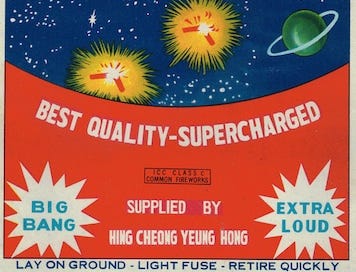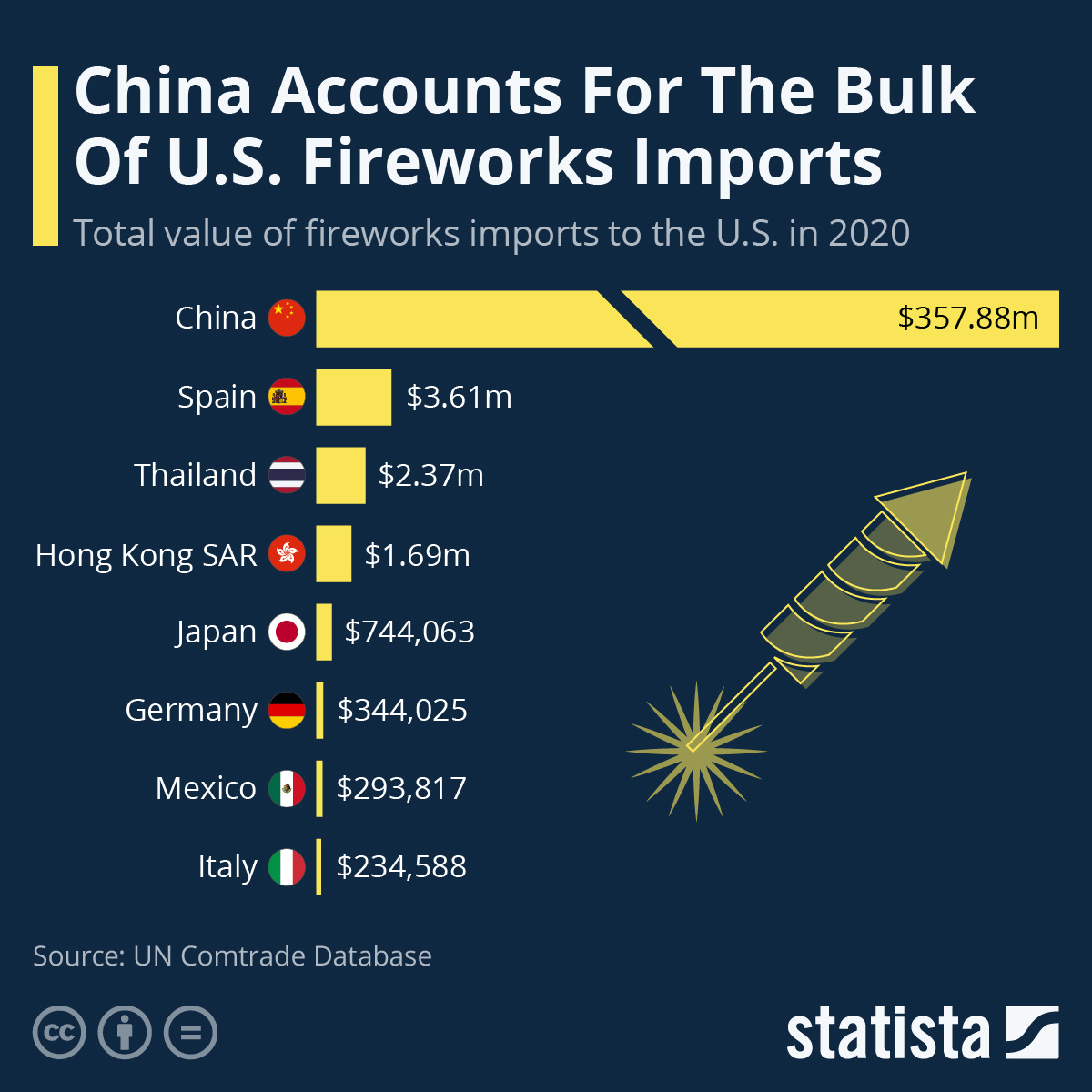Is the illusion of choice a product?
Fireworks labels are incredible, but meaningless. Nonetheless, they provide an ancillary product to the fireworks themselves.
Thanks for being here.
Want to set off fireworks in my soul? Subscribe. Think it’s good? Forward this email to a friend or share on social media. Also, help this newsletter get discovered by smashing that heart button at the bottom or the top.
Fireworks are fun as hell. Fireworks labels are also fun as hell. This makes sense--why shouldn’t the label of a product meant to entertain you with loud noises and bright colors not exude those same vibes?
Resplendent packages are adorned with names like ‘Shagadellic Mojo’ (disclosure: I purchased this one last week), ‘Radiant Orbs’, and ‘Pyro Pixie Dust’ accompanied by cartoons depicting everything from warplanes to menacing sunflowers.
What took me 36 years of life and the brief research behind this article to realize is that fireworks aren’t really differentiated from one another. Black Cat brand bottle rockets do the same thing as Phantom brand bottle rockets. The Shagadellic Mojo 200 gram repeater probably looks a hell of a lot like The Mighty Cobra 200 gram repeater. Fireworks, while enthralling, are mostly indistinguishable from one another. Fun, yet disappointing in that the opportunities to see new and different sorts of fireworks are limited. This makes it hard to expand your fireworks appreciation palate.
Adding to the soup of indifference is the fact that most fireworks ignited in the United States are imported from China, where the workers assembling them make between $80-$285/month. What’s more, most of those workers perform their firework making at the behest of one company which accounts for roughly 70% of all fireworks sold in the U.S.
With fat margins and near monopoly power, there’s not much incentive for innovation or differentiation. Because fireworks are indistinguishable from one another, their labels play two crucial roles:
Brand/product differentiation
Providing the illusion of choice
With minimal competition, number one is therefore an important prerequisite for number two. Without ostensible differentiation, there’d be no illusion of choice. In utilizing different labels for mostly indistinguishable products, fireworks vendors tack on the service of helping us generate excitement about our purchase, which heightens our enjoyment. So, in the case of fireworks, the illusion of choice delivers an ancillary service provided before buying and igniting fireworks.
Although ancillary, this service is nonetheless crucial. Discussion of fireworks leads to anticipation. Mulling over the merits of Shagadellic Mojo over Red, White and Boom inherently causes customers to visualize the fireworks. Visualization means customers are looking forward, which means eager anticipation. Anticipation cranks the tension, the increased tension heightens the crescendos of excitement and enjoyment, and the larger the crescendo, the larger the dopamine hit to our brains. Without anticipation, fireworks lose a major part of their luster.
Fireworks aren’t the only product wherein re-labeling the same product delivers an ancillary byproduct. Shampoo comes to mind. All shampoos are made of virtually the same stuff--water and surfactants (Encyclopedia Britannica defines surfactant as a: “substance that, when added to a liquid, reduces its surface tension, thereby increasing its spreading and wetting properties”). Take a look at two different types of shampoos below. The first four ingredients, which are listed in order of total amount by volume, are the exact same:
Words like ‘strengthen’, ‘hydrate’, and ‘replenish’ grace the labels, providing at best, a marginally different experience than the bulk, label-less shampoo you’d find in most locker rooms. This is because shampoo doesn’t go inside the hair, it only works to remove dirt and oil from outside.

Nonetheless, the label provides an ancillary service beyond telling us the product we’re buying is ‘shampoo’. Shampoo differs from fireworks in that its byproduct isn’t anticipation, it’s improved self-perception. Those descriptors mentioned in the previous paragraph make us feel as though we’re taking concrete steps to improve our appearance, which in turn leads to improved self-perception. Any improvement in confidence has immense value.
The illusion of choice in shampoos is what enables bespoke feelings of improved self-perception. The meaningless shampoo bottle adjectives differ from bottle to bottle, which broadens the array of illusory choices. As there are hundreds of words that could be used to describe the benefits of a shampoo, the available options for fake choices are endless. Each unique combination of wording can therefore be applied as a remedy to your unique situation.

This post, and to an extent, my previous post about Tangy Ranch Doritos, are meant to showcase examples of how branding, upon examination, can render words meaningless. Fireworks and shampoo are of course not the only two products for which this is true. This is a theme I plan to explore more in future editions, so let this serve as a jumping off point into more discussion of brands in (hopefully) more substantive topics than fireworks and shampoo.








Hey Jared - The illusion of differentiation is central to branding in commodity categories, which represent billions. There is a story - probably apocryphal - in which the CEO of Coca-Cola said that if tomorrow every factory burned down, they would okay. But if tomorrow everyone forgot what Coca-Cola meant, they would be out of business. Also - you are wrong that shampoo branding is not about anticipation. The reason shampoo advertising also features the obligatory shower=refreshment scene is precisely to build erotic, anticipatory energy.